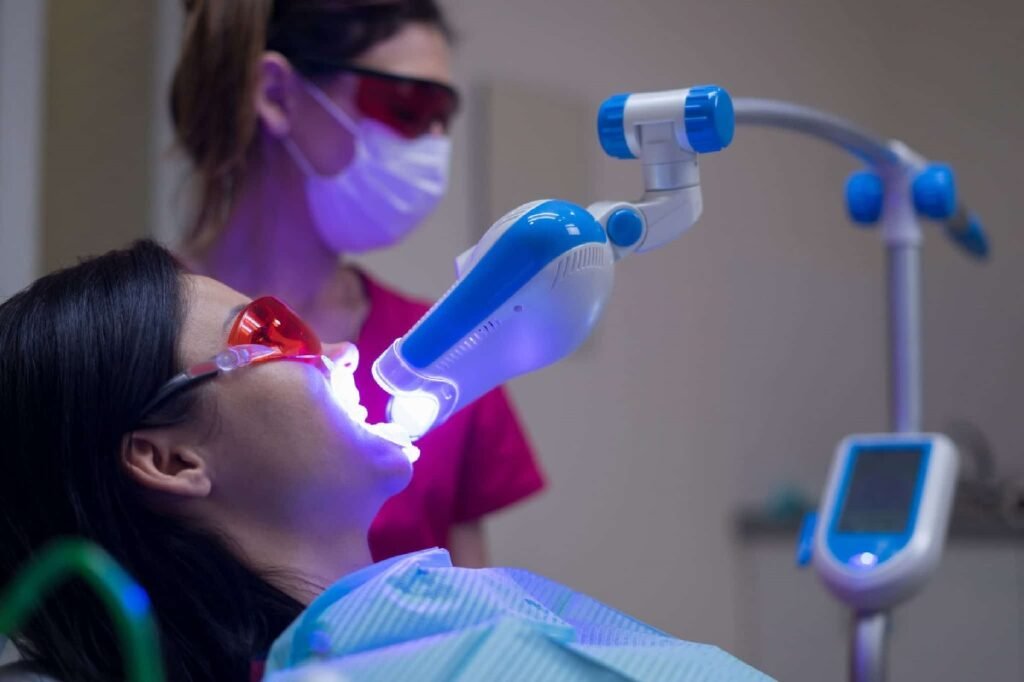Table of Contents
Introduction
Laser teeth whitening is a modern cosmetic dental procedure designed to enhance the brightness of teeth by several shades, offering a more immediate and noticeable improvement compared to traditional whitening methods. The process involves the application of a bleaching gel to the teeth, which is then activated by a laser light. This activation accelerates the whitening process, breaking down stains and discoloration more effectively.
Unlike conventional whitening techniques that may involve the use of trays, strips, or over-the-counter products, laser whitening teeth treatments leverage advanced laser technology to achieve faster and more consistent results. This method has gained significant popularity due to its efficiency and the relatively short time required to complete the procedure, often taking just about an hour per session.
The rise in popularity of laser teeth whitening can be attributed to its ability to deliver superior cosmetic results with minimal discomfort. Patients appreciate the convenience and the immediate transformation that laser technology provides. Additionally, this procedure is often preferred by individuals who have not achieved desired results from other whitening methods or who seek a more durable solution to tooth discoloration.
The general purpose of undergoing laser teeth whitening extends beyond mere aesthetics. A brighter smile can significantly boost self-confidence and enhance one’s overall appearance. The benefits of this procedure include quick application, reduced sensitivity compared to other whitening methods, and longer-lasting results. As such, laser teeth whitening has become a favored choice for those looking to invest in their dental health and appearance with a state-of-the-art approach.
The Laser Whitening Process: Step-by-Step
The journey to achieving a brighter smile through laser whitening teeth begins with an initial consultation. During this visit, a dental professional assesses the patient’s oral health to ensure they are a suitable candidate for the procedure. This evaluation may include checking for cavities, gum disease, and other dental issues that could affect the treatment’s success. Once deemed eligible, a treatment plan is discussed, and any questions or concerns are addressed.
The preparatory phase involves a thorough cleaning of the teeth to remove plaque and debris that could hinder the effectiveness of the laser whitening process. The dentist or dental hygienist will also take pre-treatment photographs to document the teeth’s color before the procedure. Protective measures, such as a rubber dam or a gel, are applied to safeguard the gums, lips, and other soft tissues from the laser’s effects.

The actual laser teeth whitening treatment commences with the application of a hydrogen peroxide-based whitening gel to the teeth. The laser device is then used to activate the gel, enhancing its bleaching properties. Patients might feel a mild warming sensation or tingling as the laser works on the teeth. This step typically takes between 15 to 60 minutes, depending on the desired level of whitening and the initial shade of the teeth. Some treatments may require multiple sessions to achieve optimal results.
Post-treatment care is crucial to maintain the newly whitened teeth. Patients are advised to avoid consuming staining substances such as coffee, tea, red wine, and tobacco for at least 24-48 hours after the procedure. Dentists may also recommend using a sensitivity toothpaste if the teeth feel sensitive following the treatment. Regular dental hygiene practices, including brushing, flossing, and routine dental check-ups, are essential to prolong the effects of laser whitening teeth.
Overall, the laser whitening process is a comprehensive approach designed to deliver significant results while ensuring the patient’s comfort and safety throughout each phase. With proper care, the dazzling effects of laser-whitened teeth can be long-lasting and contribute to a vibrant, confident smile.
Before and After Laser Teeth Whitening: What to Expect
Laser teeth whitening has become a popular method for achieving a brighter smile. Patients can expect a noticeable transformation, often lightening their teeth by several shades. However, the extent of whitening varies based on individual factors such as the initial tooth color, the presence of stains, and overall oral health.
Before the procedure, patients may have teeth stained by coffee, tea, wine, or smoking. These stains can make teeth appear yellow or brown. Laser whitening teeth treatments work by applying a bleaching agent to the teeth, which is then activated by laser light. This process breaks down stains and discoloration, resulting in a brighter, whiter appearance.
Post-treatment, many individuals report teeth that are several shades whiter. However, results can differ; some might achieve a pristine white look, while others may notice a more subtle improvement. It’s essential to manage expectations and understand that individual results vary. A consultation with a dental professional can provide a clearer idea of expected outcomes.
To determine if laser teeth whitening is right for you, evaluate your dental health status. Those with sensitive teeth, gum disease, or significant restorations like crowns or veneers might need to consider alternative whitening methods. Additionally, consulting with a dentist can help assess the suitability based on your dental history and desired outcome.
Examples and testimonials from those who have undergone laser teeth whitening often highlight the confidence boost and satisfaction with their brighter smiles. For instance, one patient remarked, “The transformation was incredible; my teeth went from dull and yellow to sparkling white in just one session.” Another shared, “I was skeptical at first, but the results exceeded my expectations. My confidence has soared.”
In summary, laser whitening teeth treatments offer a promising way to achieve a whiter smile, but individual results can vary. Consulting with a dental professional and considering personal dental health are crucial steps in determining if this procedure is right for you.
Cost of Laser Teeth Whitening: What You Need to Know
Laser teeth whitening, a popular choice for achieving a brighter smile, comes with various costs that potential patients should consider. The price typically ranges from $300 to $1,500 per session, depending on several factors. One of the primary determinants is the geographical location of the dental clinic. Clinics in metropolitan areas tend to charge higher fees compared to those in suburban or rural settings.
The expertise and reputation of the dentist performing the procedure also play a significant role in the cost. Highly experienced dentists or those with specialized training in cosmetic dentistry may charge more for their services. Additionally, the extent of whitening required can impact the overall cost. Patients with severely stained teeth might need multiple sessions, which can increase the total expense.
When comparing laser whitening teeth treatment to other whitening options, the costs can be higher. Over-the-counter products, such as whitening strips and gels, are significantly cheaper but often less effective. Professional treatments like bleaching trays provided by dentists fall in the mid-range of the cost spectrum but may require more time to achieve desired results. Laser whitening, while more expensive, offers quicker and often more dramatic results.
Insurance coverage for laser teeth whitening is generally not available, as it is considered a cosmetic procedure. However, some dental clinics offer flexible payment plans to make the treatment more accessible. These plans can include financing options that allow patients to pay over time, reducing the immediate financial burden. It is advisable to consult with the dental clinic about available payment options and any potential discounts or promotions.
Understanding the full scope of costs associated with laser teeth whitening is essential for making an informed decision. Balancing the price with the expected outcomes and considering alternative treatments will help in choosing the best option for a brighter, more confident smile.
Pros of Laser Teeth Whitening
Laser teeth whitening has emerged as a leading choice for individuals seeking a brighter smile. One of the primary advantages of opting for laser whitening teeth treatment is its remarkable effectiveness. Unlike traditional whitening methods, which may take weeks or even months to show results, laser whitening can deliver visibly whiter teeth in just a single session. This speed and efficiency are significant benefits for those with busy schedules or upcoming events.
Another compelling benefit is the precision of the procedure. During laser teeth whitening, dentists can target specific areas of discoloration, ensuring a uniform and consistent result. This precision minimizes the risk of over-whitening, which can sometimes occur with at-home treatments. Moreover, the procedure is highly controlled, reducing the likelihood of gum irritation or tooth sensitivity, commonly associated with other whitening methods.
Safety is another critical factor that makes laser whitening teeth a preferred option. The procedure is conducted under the supervision of a dental professional, ensuring that appropriate measures are taken to protect the gums and surrounding oral tissues. This professional oversight significantly lowers the risk of complications, making it a safer alternative compared to over-the-counter whitening kits.
Additional benefits of laser teeth whitening include improved confidence and appearance. A brighter smile can enhance one’s overall facial aesthetics, leading to better self-esteem and a more positive self-image. The results are not only immediate but also long-lasting, reducing the need for frequent touch-ups and maintenance.
Furthermore, the non-invasive nature of the treatment is a significant advantage. There are no surgical procedures or lengthy recovery times involved. Patients can typically resume their daily activities immediately after the session, making it a convenient option for those seeking quick and effective teeth whitening solutions.
Cons of Laser Teeth Whitening
While laser whitening teeth treatments offer appealing benefits, it is essential to consider the potential downsides and risks. One of the most commonly reported side effects is increased tooth sensitivity. Patients often experience heightened sensitivity to hot and cold temperatures following the procedure. This discomfort can persist for several days post-treatment, which may be inconvenient for some individuals.
Another potential issue is gum irritation. The laser and whitening agents used during the process can sometimes cause irritation to the gums, leading to redness and swelling. This risk is particularly pronounced if the protective barriers are not applied correctly or if an individual has pre-existing gum conditions. Therefore, it is crucial to ensure that the treatment is carried out by a qualified professional to minimize such risks.
Cost is another significant consideration when evaluating the cons of laser teeth whitening. This method tends to be more expensive compared to other whitening options such as over-the-counter products or traditional bleaching methods. The higher cost can be a deterrent for many people, especially since multiple sessions may be required to achieve the desired level of whiteness.
Moreover, the results of laser teeth whitening can vary between individuals and are not always permanent. Factors such as dietary habits, smoking, and overall dental hygiene can influence the longevity of the whitening effect. As a result, some patients may find themselves needing touch-up sessions to maintain their results, further adding to the overall cost and effort.
In summary, while laser teeth whitening can provide fast and effective results, it is important to weigh these benefits against the potential downsides. Increased sensitivity, risk of gum irritation, higher costs, and variable longevity of results are all factors that should be carefully considered before opting for this treatment. Consulting with a dental professional can provide a more personalized assessment of whether laser teeth whitening is the right choice for you.
Tips for Maintaining Whitened Teeth Post-Treatment
After undergoing a laser whitening teeth treatment, it is crucial to adopt practices that help sustain the whitening effects. First and foremost, maintaining excellent oral hygiene is essential. Brushing your teeth at least twice daily with a toothpaste specifically designed for whitening can significantly contribute to retaining the brightness of your smile. Additionally, incorporating flossing and mouth rinsing into your daily routine ensures the removal of plaque and food particles that could potentially lead to discoloration.
Dietary considerations also play a pivotal role in preserving the results of laser whitening teeth. It is advisable to avoid consumables known for their staining properties. Beverages such as coffee, tea, red wine, and cola can cause stains and should be consumed in moderation or with a straw to minimize contact with the teeth. Similarly, foods like berries, tomato sauce, and soy sauce should be eaten cautiously. When you do indulge in these items, rinsing your mouth or brushing your teeth shortly afterward can help mitigate their staining effects.
Regular dental check-ups are indispensable for maintaining the health and appearance of your teeth. Professional cleanings not only keep your teeth and gums in optimal condition but also remove surface stains that may accumulate over time. Your dentist may also recommend periodic touch-up treatments to preserve the results of your laser whitening teeth procedure.
Over-the-counter products can also assist in prolonging the whitening effects. Whitening strips, gels, and pens are effective options for at-home maintenance. Additionally, using a whitening mouthwash can help keep your teeth bright between professional treatments. However, it is essential to choose products that are safe and approved by dental professionals to avoid potential damage to your enamel.
By following these practical tips, you can enjoy the long-lasting benefits of your laser whitening teeth treatment, ensuring your smile remains radiant and healthy.
Is Laser Teeth Whitening Right for You?
Determining whether laser teeth whitening is the right choice involves considering several factors, including age, dental health, lifestyle, and personal preferences. This advanced procedure can provide quick and effective results, but it may not be suitable for everyone. Below, we outline key considerations to help you assess your suitability for laser teeth whitening.
Age: Most dental professionals recommend laser teeth whitening for individuals aged 16 and above. Younger patients may experience heightened tooth sensitivity, and their teeth are still developing, making them less ideal candidates for this procedure.
Dental Health: Your overall dental health plays a crucial role in determining your eligibility for laser teeth whitening. Individuals with cavities, gum disease, or exposed roots should address these issues before considering whitening treatments. Additionally, those with dental restorations like crowns, veneers, or fillings should note that these do not respond to whitening agents and may require replacement to match the newly whitened teeth.
Lifestyle: Your lifestyle choices significantly impact the longevity and effectiveness of laser teeth whitening. Habits such as smoking or consuming staining substances like coffee, tea, red wine, and certain foods can reduce the efficacy of the treatment. For optimal results, it’s advisable to maintain good oral hygiene and limit the intake of staining beverages and foods.
Personal Preferences: Consider your aesthetic goals and expectations. Laser whitening teeth can produce noticeable results in a short time, making it ideal for those seeking immediate improvements. However, if you prefer a more gradual change, other whitening methods may be more appropriate.
To help you further assess your suitability, here is a quick checklist:
- Are you over the age of 16?
- Do you have good overall dental health?
- Are you free from cavities or gum disease?
- Do you avoid habits that stain teeth (e.g., smoking, excessive coffee consumption)?
- Are you looking for quick and noticeable results?
If you answered “yes” to most of these questions, laser teeth whitening might be a suitable option for you. However, it is essential to consult with your dentist to obtain personalized advice based on your specific dental health and aesthetic goals.
FAQs
-
Is Laser Whitening Good for Your Teeth?
Laser teeth whitening is a popular cosmetic dental procedure aimed at enhancing the brightness of your teeth. It involves applying a whitening gel to the teeth and then using a laser to activate the gel. This process can significantly lighten the shade of your teeth, providing a visibly whiter smile. However, it is essential to consult with your dentist to determine if this procedure is suitable for your dental health.
-
What Are the Disadvantages of Laser Whitening?
While laser teeth whitening can offer impressive results, it does have some disadvantages. Common side effects include temporary tooth sensitivity and gum irritation. These issues typically subside within a few days. Another potential disadvantage is the cost, as laser whitening tends to be more expensive than other whitening methods. Additionally, the effectiveness of the treatment can vary depending on the original shade and condition of the teeth.
-
How Many Sessions of Laser Teeth Whitening Are Needed?
The number of sessions required for laser teeth whitening can vary based on individual needs and the level of discoloration. Generally, most patients achieve their desired results after one to two sessions. Each session typically lasts between 30 to 60 minutes. Your dentist will assess your teeth and recommend the appropriate number of sessions to achieve optimal results.
-
How Much Does Laser Whitening Cost at the Dentist?
The cost of laser teeth whitening can vary widely depending on the dental practice and geographic location. On average, the price ranges from $300 to $1,500 per session. It is advisable to consult with your dentist to get a precise estimate and to discuss any potential financing options that may be available to you.









